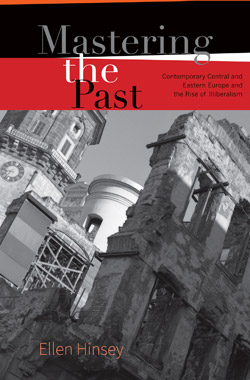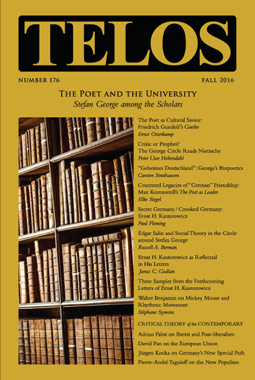By Telos Press · Monday, February 13, 2017 Mastering the Past:
Contemporary Central and Eastern Europe and the Rise of Illiberalism
by Ellen Hinsey
 Over the last decade Ellen Hinsey has traveled across Central and Eastern Europe researching a critical shift in the European political landscape: the rise of illiberalism. A quarter of a century after the changes of 1989—and as former Soviet sphere societies come to terms with their histories—the specters of populism, nationalism, extreme-right parties, and authoritarian rule have returned in force. Through a series of eyewitness reports, Mastering the Past offers an insider’s view of key political events, including the 2012 Russian elections, the Polish presidential plane crash in Smolensk, and Prime Minister Viktor Orbán’s vision for a new Hungary. Hinsey explores the darkening hour of European politics with an incisive mind and an eye for detail, recording the urgent danger that illiberalism represents for the new century. Over the last decade Ellen Hinsey has traveled across Central and Eastern Europe researching a critical shift in the European political landscape: the rise of illiberalism. A quarter of a century after the changes of 1989—and as former Soviet sphere societies come to terms with their histories—the specters of populism, nationalism, extreme-right parties, and authoritarian rule have returned in force. Through a series of eyewitness reports, Mastering the Past offers an insider’s view of key political events, including the 2012 Russian elections, the Polish presidential plane crash in Smolensk, and Prime Minister Viktor Orbán’s vision for a new Hungary. Hinsey explores the darkening hour of European politics with an incisive mind and an eye for detail, recording the urgent danger that illiberalism represents for the new century.
Continue reading →
By Telos Press · Thursday, October 20, 2016 “Fraternity means that the father no longer sacrifices the sons; instead the brothers kill one another. Wars between nations have been replaced by civil war. The great settling of accounts, first under national ‘pretexts,’ led to a rapidly escalating world civil war.”
—Ernst Jünger, Eumeswil
Continue reading →
 One often speaks of the importance of poetry for thought, even of poetry as a mode of thinking, and perhaps nowhere more than in Germany, the country of Dichter and Denker, of poets and thinkers. The German intellectual tradition is defined by a long, intimately interwoven relation between poetry and thought going back to the solidification of the Modern Age in the eighteenth century: Klopstock’s “Republic of Letters”; Goethe and Schiller’s Classicism, especially Schiller’s “aesthetic state”; Hölderlin’s “founding poets” and the centrality of poets in “the time of need”; Jena Romanticism’s inextricable relation between “Symphilosophie” and “Sympoesie”; Hegel’s definition of beauty as “the sensible shining forth of the idea”; and onward to this day. One often speaks of the importance of poetry for thought, even of poetry as a mode of thinking, and perhaps nowhere more than in Germany, the country of Dichter and Denker, of poets and thinkers. The German intellectual tradition is defined by a long, intimately interwoven relation between poetry and thought going back to the solidification of the Modern Age in the eighteenth century: Klopstock’s “Republic of Letters”; Goethe and Schiller’s Classicism, especially Schiller’s “aesthetic state”; Hölderlin’s “founding poets” and the centrality of poets in “the time of need”; Jena Romanticism’s inextricable relation between “Symphilosophie” and “Sympoesie”; Hegel’s definition of beauty as “the sensible shining forth of the idea”; and onward to this day.
Continue reading →
By Telos Press · Thursday, August 18, 2016 “Fraternity means that the father no longer sacrifices the sons; instead the brothers kill one another. Wars between nations have been replaced by civil war. The great settling of accounts, first under national ‘pretexts,’ led to a rapidly escalating world civil war.”
—Ernst Jünger, Eumeswil
Continue reading →
By Andreas Pantazopoulos · Thursday, August 11, 2016 How are we to explain the current “revolt against the elites,” the “new populist wave,” referred to by the French philosopher, political scientist, and historian of ideas Pierre-André Taguieff in a recent interview? What follows will try to reflect on specific aspects of the intimate relationship between populism and nationalism, the import of the conspiracist view of sociopolitical phenomena, and the overall “populist illusion” in the left-wing version of populism, with reference to the Greek experience of the past few years, notably through the Syriza phenomenon. To the extent possible, an effort will be made to examine this against the backdrop of a comparative approach to left-wing populism in general.
Continue reading →
By Pierre-André Taguieff · Saturday, June 25, 2016 Today, the anti-elitist political concept responds directly and effectively to social demands in Europe and the United States. And this anti-elitist or anti-system concept perfectly encompasses both the left and right, and, of course, the extremists. As different as they are, the new leaders are protesting and transgressive. Their demagoguery is marked by the language of transgression, provocation, and excess, based on the subversion of language or behavior codes: for them, this is a matter of drawing a clear distinction from the standard model policy. They can complain about being demonized by their opponents, while still trying to stay slightly demonized in order to maintain their attractiveness. This is the prerequisite to the seduction that they perform. This differentiates them from formatted and conformist leaders, who pursue respectability, which makes them somewhat watery.
Continue reading →
|
|
 Over the last decade Ellen Hinsey has traveled across Central and Eastern Europe researching a critical shift in the European political landscape: the rise of illiberalism. A quarter of a century after the changes of 1989—and as former Soviet sphere societies come to terms with their histories—the specters of populism, nationalism, extreme-right parties, and authoritarian rule have returned in force. Through a series of eyewitness reports, Mastering the Past offers an insider’s view of key political events, including the 2012 Russian elections, the Polish presidential plane crash in Smolensk, and Prime Minister Viktor Orbán’s vision for a new Hungary. Hinsey explores the darkening hour of European politics with an incisive mind and an eye for detail, recording the urgent danger that illiberalism represents for the new century.
Over the last decade Ellen Hinsey has traveled across Central and Eastern Europe researching a critical shift in the European political landscape: the rise of illiberalism. A quarter of a century after the changes of 1989—and as former Soviet sphere societies come to terms with their histories—the specters of populism, nationalism, extreme-right parties, and authoritarian rule have returned in force. Through a series of eyewitness reports, Mastering the Past offers an insider’s view of key political events, including the 2012 Russian elections, the Polish presidential plane crash in Smolensk, and Prime Minister Viktor Orbán’s vision for a new Hungary. Hinsey explores the darkening hour of European politics with an incisive mind and an eye for detail, recording the urgent danger that illiberalism represents for the new century. 


